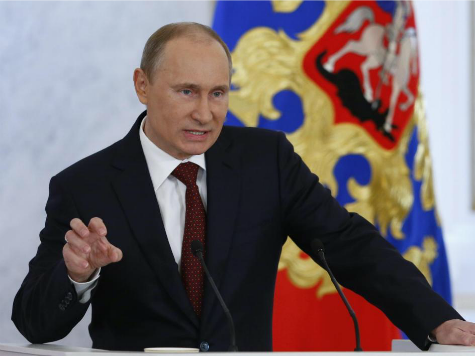
A new law in Russia imposes fines as heavy as 100,000 rubles on individuals and corporations who attempt to distribute works of art that include profanity. The move, which includes all forms of art from theater to recorded music, is the latest attempt by the Putin regime to control and limit Russian speech.
According to the Wall Street Journal, the new law covers all works of art produced after July 1. Films with profanity will not receive state distribution licenses, keeping them out of theaters, and books will require warnings on the cover should they contain foul language. Public performances of theater works are prohibited from using swearing, and even certain bloggers considered mass media could be fined.
The Journal notes that bloggers with more than 3,000 page views will be forced to adhere to anti-swearing legislation beginning in August. The definition of “blogger” is not entirely clear from the legislation, however, so it is unclear whether the law will apply to microbloggers on sites like Twitter or more extended posts on social media platforms like VKontakte.
The law has triggered some outrage with those who see it as a return to Soviet values of limited speech and note that Russian language has a rich history of colorful language. The BBC notes that the Communist Party restricted artists in the Soviet Union from using “‘decadent’ Western fashions” and implored them to “stick to traditional values,” whatever the Party deemed those to be.
The legislation also leaves a mystery which words, exactly, will be targeted. New York magazine has some unrepeatable suggestions, which they note the Moscow Times reported the Institution of Russian Language at the Russian Academy of Sciences declared the cornerstones of Russian language profanity. Interestingly, despite the law apparently targeting art exclusively, New York notes that a spokesperson for the Ministry of Culture told the Moscow Times that “new strictures will be limited to pop culture and will not apply to matters of art: ‘It will be up to the artistic director to decide what to do with swearing, whether to break the new law or not, we will not interfere in the process.'” The spokesperson added that the law was “not aggressive.”
Free speech under Putin has been elusive. Aside from international headline-grabbing clashes with political opposition forces and anti-Putin activists, Putin has been sensitive in allowing parody or comedic commentary about him on television. Last year, Russian state television canceled a show for a joke revolving around Putin’s divorce. In another nod to state control of broadcasting, Russian state television edited out a significant technical error occurring at the opening ceremonies for the Sochi Winter Olympics.

COMMENTS
Please let us know if you're having issues with commenting.